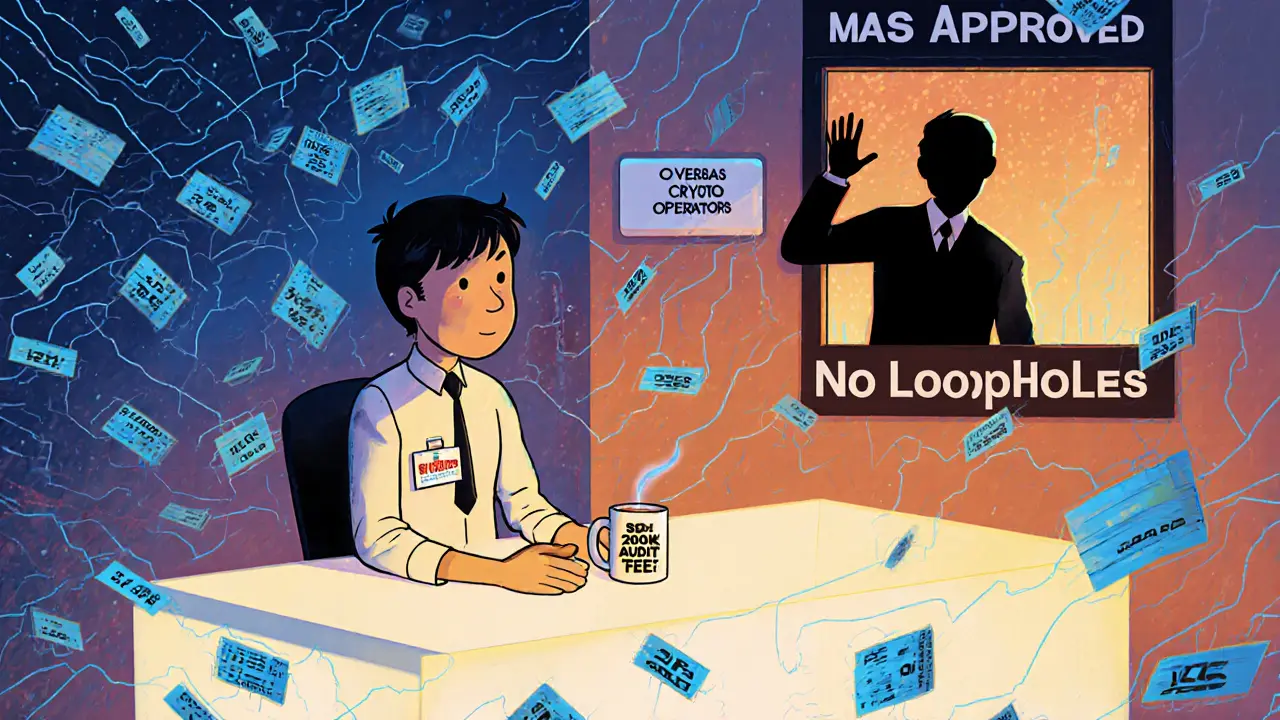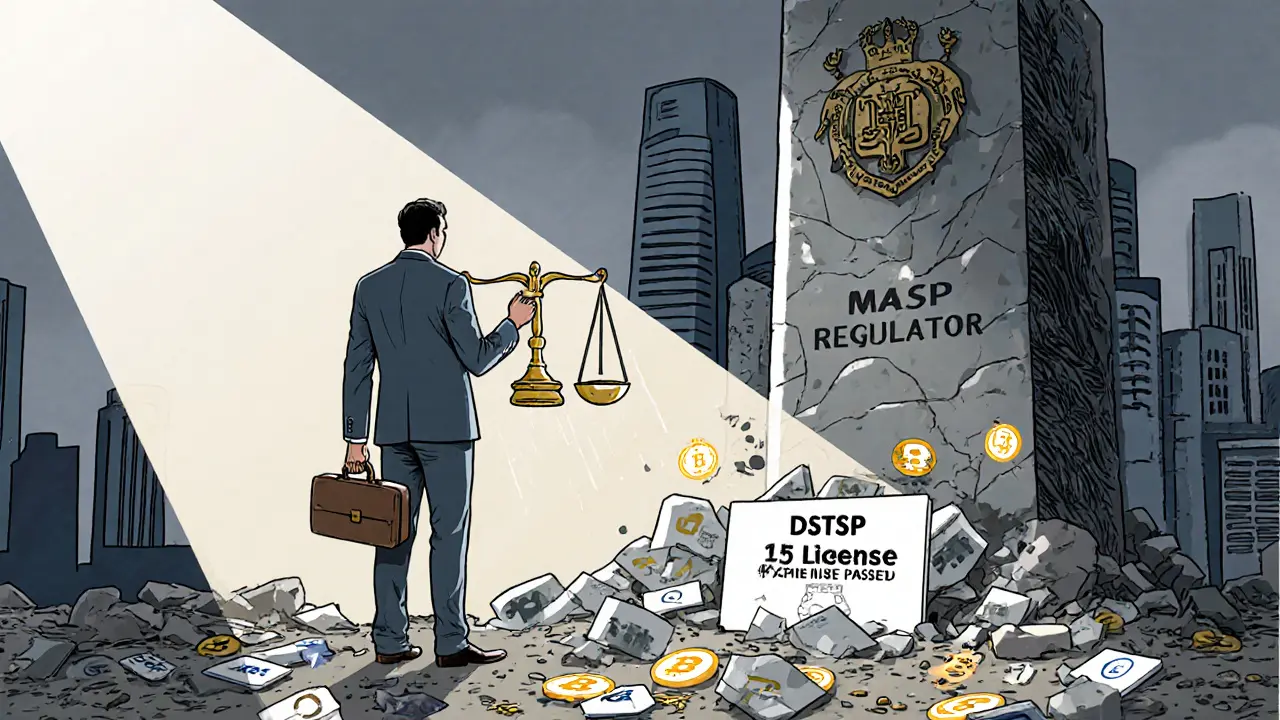Singapore Crypto Compliance Cost Calculator
Cost Breakdown
Calculate minimum financial requirements for MAS DTSP license compliance
Back in 2022, Singapore was seen as one of the friendliest places in the world for crypto companies. Now, it’s one of the toughest. The Monetary Authority of Singapore (MAS) didn’t just tighten the rules - it rewrote them. By June 30, 2025, any company offering crypto services from Singapore had to meet a new, brutal standard. If you didn’t, you were shut down. No warnings. No extensions. No exceptions.
Why MAS Changed Everything
MAS didn’t wake up one day and decide to crush the crypto industry. It saw a pattern. Companies were registering in Singapore not because they wanted to serve local customers, but because Singapore’s name carried weight. They’d get a license, use it to look legit, then run their business from overseas - often serving clients in countries with little to no oversight. This wasn’t innovation. It was reputation laundering. In a June 2025 statement, MAS made it clear: they wouldn’t tolerate being used as a fig leaf for risky operations. Their priority isn’t growth. It’s trust. Singapore’s global reputation as a stable, clean financial center is more valuable than any number of crypto startups.The DTSP License: Only for the Elite
The new rule is called the Digital Token Service Provider (DTSP) license, created under the Financial Services and Markets Act 2022 (FSMA). Sounds simple, right? It’s not. To get one, you need:- A minimum capital reserve of SGD 1 million (about USD 740,000)
- A full-time, Singapore-based compliance officer - not a contractor, not a remote employee. Someone physically in Singapore, with real experience in AML/CFT
- Annual audits by an independent firm approved by MAS
- Full compliance with the Travel Rule: collect and share names, ID numbers, and account details for every transaction over SGD 1,500
- Advanced cybersecurity systems that meet MAS’s strict standards
Extra-Territorial Power: You Can’t Hide
Section 137 of the FSMA is what makes this regulation terrifying for crypto firms. It doesn’t matter where your users are. Doesn’t matter where your servers are. If your company is registered in Singapore - even if you’re just a shell with a PO box - MAS has legal authority over you. You’re subject to their rules, no matter where you operate. This isn’t just about local businesses. It’s about global firms that set up Singapore entities to gain credibility. Now, those companies have to comply with Singapore’s rules, even if they’re serving clients in Nigeria, Brazil, or Russia. There’s no loophole. No gray area.Consumer Protection: No More Risky Moves
MAS also cracked down on how crypto platforms treat customers. Starting in September 2024, they introduced strict consumer rules:- You can’t let customers buy crypto with credit cards
- You must assess whether a customer understands the risks - not just check a box
- You must clearly warn them that crypto prices can crash overnight

The Travel Rule: A Technical Nightmare
The Travel Rule isn’t new in crypto. But MAS made it harder than most. You need to collect and transmit:- Full legal names
- Government-issued ID numbers
- Account or wallet addresses
- Transaction details for every transfer over SGD 1,500
Penalties Are Brutal
Violating MAS rules doesn’t mean a warning letter. It means:- Fines up to SGD 200,000 (USD 147,000)
- Up to two years in prison for executives
- Immediate shutdown of operations
The Human Cost
This isn’t just about companies. It’s about people. The requirement for a Singapore-based compliance officer has created a massive talent shortage. Salaries for qualified officers have jumped to between SGD 150,000 and SGD 250,000 per year. Many firms can’t find anyone who meets MAS’s standards - and those who do are being poached by the few who made it through. LinkedIn data shows crypto-related job postings in Singapore dropped 37% in Q1 2025 compared to Q4 2024. Young professionals who built careers in crypto are now looking for jobs in finance, tech, or overseas.
How This Compares to the Rest of the World
While Singapore is shutting the door, other places are opening theirs:- Switzerland offers clear licensing and low barriers for crypto firms
- The UAE’s Dubai Virtual Assets Regulatory Authority (VARA) actively recruits global platforms
- Japan and South Korea have structured but workable frameworks
What’s Next?
MAS hasn’t said it’s done. In May 2025, they hinted at new rules for DeFi protocols and stablecoins later in 2025. Stablecoins, in particular, are under close watch. MAS wants them to be “highly stable” - meaning they’ll likely require full backing in cash or low-risk assets. Industry experts are divided. Some say Singapore’s move will permanently damage its role in global crypto. Others believe it’s the right call - that a clean, small, regulated market is better than a noisy, risky one. One thing’s certain: if you’re thinking of launching a crypto business in Singapore, you’re too late. The window closed on June 30, 2025. The only ones left are the ones who paid the price - and even they aren’t guaranteed to survive.Is There Any Way Around It?
No. Not really. Some firms tried to operate without a license, claiming they weren’t “based” in Singapore. MAS responded by tracking directors, bank accounts, and even email servers. If any part of your operation - even one person - is physically in Singapore, you’re covered by their rules. There’s no offshore workaround. No shell company trick. MAS has the legal power, the resources, and the political will to enforce this. The only safe path was to comply - and most didn’t make it.Can I still trade crypto in Singapore?
Yes, individuals can still buy and sell crypto on platforms that are licensed by MAS. But the number of platforms has dropped sharply. Most international exchanges that used to serve Singapore users no longer do - unless they obtained a DTSP license. If you’re trading, make sure the platform you use is on MAS’s official list of licensed providers.
What happens if I run a crypto business from outside Singapore but use a Singapore-based bank account?
If your company is registered in Singapore - even if you’re not physically there - MAS can still hold you accountable. Using a Singapore bank account alone doesn’t automatically trigger jurisdiction, but if MAS determines your business is managed from Singapore (e.g., directors live there, decisions are made there), they will treat you as a DTSP and require full compliance. Don’t assume you’re safe just because your servers are overseas.
Are stablecoins banned in Singapore?
No, stablecoins aren’t banned. But they’re now tightly regulated. MAS requires issuers to hold reserves that ensure “a high degree of value stability” - meaning they must be backed 1:1 by cash or low-risk assets like government bonds. Algorithmic stablecoins (those not fully backed) are effectively banned. Only fully collateralized stablecoins can operate legally.
Can I apply for a DTSP license now in late 2025?
Technically, yes - but don’t expect approval. MAS has stated it will issue licenses only in “extremely limited circumstances.” The June 30, 2025 deadline was a hard cutoff for existing applicants. New applications are being reviewed with extreme scrutiny, and approval is rare. Unless you have elite compliance infrastructure and a strong operational reason to be in Singapore, your application will likely be denied.
Why did MAS choose such a strict approach compared to other countries?
MAS isn’t trying to be the biggest crypto hub - it wants to be the most trusted. Other countries like the UAE or Switzerland focus on attracting business. Singapore prioritizes financial integrity. They saw how crypto firms abused their reputation and decided to protect their brand over growth. It’s a long-term strategy: fewer players, but zero tolerance for risk. They believe this will preserve Singapore’s standing as a global financial center.
